HRC55: Report of the Independent International Commission of Inquiry on Ukraine: concerns over war crimes
The 34th meeting of the 55th Session of the Human Rights Council
26 February – 5 April 2024
Item 4: Interactive dialogue with Commission of inquiry Ukraine
18 March 2024
Inès Najeh / GICJ
Executive summary
On 18 March 2024, during the 34th meeting of the 55th Session of the Human Rights Council, the Chair of the Independent International Commission of Inquiry on Ukraine opened the interactive dialogue by presenting the Commission’s findings, as per the COI’s latest report (A/HRC/55/66). The report focused on violations of Human rights, international law and international humanitarian law which occurred during the Russo-Ukrainian war.
The COI’s latest report, submitted in March 2024, provides compelling evidence of numerous violations perpetrated by the Russian Federation as well as two cases of arbitrary arrest committed by Ukrainian authorities. As such, the report documented these violations, including indiscriminate attacks with the use of explosive weapons in populated areas, resulting in extensive civilian casualties and the destruction of medical facilities and cultural landmarks. Additionally, the Commission found evidence of war crimes such as torture, deliberate killings and sexual violence, particularly against women and girls. The forced transfer of children from Ukraine to Crimea by Russian authorities has also been classified as a war crime.
The COI emphasised the urgent need for accountability and justice, urging all parties to conduct prompt and impartial investigations into allegations of international crimes. They called on the Russian Federation to halt all violence against civilians, cease the use of torture, and take measures to prevent sexual violence. Similarly, they urged Ukraine to address the mental and physical health needs of conflict survivors and prioritise support for victims of sexual and gender-based violence.
Multiple States condemned these violations and affirmed their commitment to holding perpetrators accountable. Participants of the interactive dialogue emphasised on the need for effective and reliable accountability mechanisms.
Geneva International Centre for Justice (GICJ) welcomes the COI’s report on the situation in Ukraine and aligns with the recommendations made in the report. GICJ urges the international community to cooperate in order to ensure accountability mechanisms and support for victims, further underscoring the importance of upholding international law, human rights and justice for all.
Background
The Russian invasion of Ukraine, which began on 24 February 2022, is considered, at large, as an extreme escalation of military operations since the annexation of Crimea in 2014. Crimea, transferred to the Ukrainian SSR in 1954 by the Presidium of the Supreme Soviet, has a significant Russian-speaking diaspora, and is of strategic importance to Russia, notable due to its access to the Black Sea.
Following the overthrowing of the pro-Russian, Ukrainian president, Victor Yanukovych in 2014, pro-Russia separatist movements emerged in eastern Ukraine, leading to the destabilisation of the Donbass region, which sought to join Russia. The conflict escalated into a full-scale war between Ukrainian government forces and pro-Russian separatists, with Russia allegedly providing military support, including troops and equipment, to the separatist forces. The conflict resulted in thousands of deaths, widespread displacement of civilians, and significant destruction of infrastructure. Multiple attempts at ceasefires and peace negotiations were made, including the Minsk agreements which failed to achieve a lasting resolution and accountability.
Since 2022, the conflict between Russia and Ukraine has continued to worsen with violence and international tensions. The conflict has taken a heavy toll on civilians, with reports of casualties, forced displacement, trafficking of children and humanitarian crises in affected regions. As diplomatic efforts persist, the war in Ukraine continues to pose a threat to regional stability, the path to a sustainable resolution remains uncertain, and the spectre of further escalation hangs over the region. Furthermore, evidence shows that the Russian military forces are actively conducting indiscriminate assaults, in violation of international humanitarian law, resulting in civilian casualties and the destruction of civilian infrastructure such as hospitals and cultural landmarks.
During the 55th Session of the Human Rights Council, the interactive dialogue with the Commission of inquiry (COI) on Ukraine was held. The COI was established by the Human Rights Council on 4 March 2022 (resolution 49/1) to investigate alleged violations and abuses of human rights and international humanitarian law in the context of Russia’s aggression on Ukraine, as well as to collect and analyse evidence of such violations and of crimes committed by individuals or entities in order to ensure accountability and end impunity. The mandate of the commission was extended twice in April 2023 and April 2024 for an additional year each time.
Report of the Independent International Commission of Inquiry on Ukraine
The independent international Commission of Inquiry (COI) on Ukraine submitted its latest report on the 5th march 2024. The report compiles evidence of human rights and international humanitarian law violations by parties involved in the Russo-Ukrainian war.
First, the report highlights international law and international humanitarian law violations with evidence of severe impacts on civilians and civilian property caused by attacks with explosive weapons in populated areas, especially during early stages of the armed conflict in Mariupol city. Due to the fact that the Commission could not gain access to the city of Mariupol, most testimonials are based on survivors of the attacks. The fighting in the city caused the destruction of at least 58 medical buildings, including a maternity hospital which the Commission considered an infringement of international humanitarian law. The commission recalled that, as of 15 February 2024, the Office of the United Nations High commissioner for Human rights had recorded 10,582 killed and 19,875 injured. Indeed, indiscriminate attacks on populated areas were conducted, including attacks with explosive weapons, causing civilian casualties. The COI considered that Russian armed forces did not fulfil all necessary precautions as outlined in international humanitarian law. The persistence of these assaults highlights a consistent failure to uphold the international principle of distinguishing between military objectives and civilians.
Additionally, the report highlights war crimes including torture, deliberate killings, rape, and illegal detentions perpetrated by Russian authorities. It also cites specific instances of deliberate killings and torture in Ukraine and the Russian Federation, such as interrogations conducted by Russian soldiers using methods of torture. The Commission documented instances of violations of personal integrity against prisoners of war, a significant portion of whom were detained during house searches due to “suspicions of collaborating” with Ukrainian armed forces. Furthermore, the report emphasises the classification of torturing prisoners of war as a war crime.
Moreover, the report highlighted cases of sexual and gender-based violence on women and girls between the ages of 15 to 83 years old. The Commission states that war crimes of rape and sexual violence, mostly conducted during house searches and detentions, amounted to torture.
Regarding the transfer of children, the report focused on the transfer of 46 children from Kherson Regional Children’s Home to Crimea by orders of the Russian authorities. The report shows evidence that Russian authorities transferred children for reasons of safety without informing the parents. The report concludes that the relocation of children was not temporary and thus constituted the war crime of illicit transfer.
Moreover, the report notes the ongoing work of the Commission regarding allegations of genocide in Ukraine, by reviewing public statements using “dehumanising language and calls for hate, violence, and destruction” and calling for the killing of persons. The report underlines the responsibility of States to prevent such language and expressions.
Additionally, the report contains two cases of human rights violations, against alleged collaborators, committed by Ukrainian authorities. The cases reported by the Commission concern victims unlawfully apprehended, detained, and subjected to mistreatment, constituting breaches of international human rights law. The report highlights that the victims were not provided with explanations for their arrest, their basic rights of defence were denied and the authorities involved committed acts of violence.
The report concludes by reiterating the importance of ensuring that perpetrators are identified and held accountable. As such, the Commission recommended all parties to conduct prompt and impartial investigations into the accusations of international crimes and violations of international humanitarian law. The Commission urged the Russian Federation to immediately halt all violence against civilians and civilian structures; stop the use of torture against prisoners of war and civilians; and take measures to prevent sexual violence. The parties need to ensure the minimization of the use of explosive weapons while respecting humanitarian law.
In this report, the COI made recommendations to Ukraine such as addressing mental health and psychosocial needs resulting from the conflict by improving access to relevant services; involving victims in the process of designing emerging programs through meaningful consultations; strengthening capacity for gender-sensitive legal processes to prioritise survivors of sexual and gender-based violence, and provide comprehensive support.
Finally, the COI recommended that regional and international organisations, and States, strengthen accountability mechanisms by improving coordination and by supporting the participation of civil society representatives’ victims. Moreover, there is a need to further incorporate human rights aspects of the conflict in Ukraine into the Security Council’s agenda.
Interactive dialogue
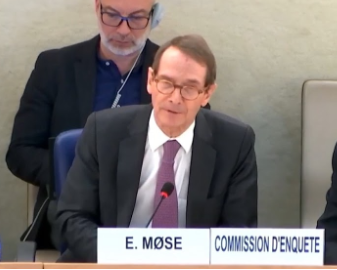 Eric Møse, the Chair of the Independent International Commission of Inquiry on Ukraine, expressed deep gratitude to victims, witnesses, and the Government of Ukraine who shared valuable information with the Commission. Mr Møse noted the unanswered communications addressed to the Russian Federation, recalling that, since the invasion of Ukraine, more than 10 000 civilians have been killed and close to 20 000 others have been injured. He continued by recalling that Russian armed forces persist in launching illegal attacks using explosive weapons in densely populated regions, resulting in extensive civilian casualties and widespread devastation. These assaults have also targeted crucial infrastructure such as medical facilities and cultural landmarks. The Commission noted that Russian forces often neglect to take reasonable precautions to avoid harming civilians, especially in regards of evidence of grave war crimes such as intentional killing, torture, rape and trafficking children. Moreover, the Commission highlighted instances of Human rights violations by Ukrainian authorities against individuals accused of collaborating with Russia. Futhermore, Mr Møse noted the numerous cases of torture of Ukrainian prisoners of war, subjected to brutal treatment over extentended periods of time (beatings, electric shocks, deprivation fo food, etc) often in detention facilities within the Russian Federation. He added that there was evidence that these acts of torture were carried out with the knowledge and, possibly, under the direction of higher-ranking authorities, within a climate of impunity. Moreover, the Commission continues to investigate cases of sexual violence committed by Russian authorities, against women and girls aged 15 to 83, which are crimes that amount to torture as a war crime. The report also presents evidence of Russian authorities transferring 46 children to Crimea, which, according to Ukrainian authorities, at the time of writing had not been returned under Ukrainian government control. Eric Møse reiterates that these illegal transfers and trafficking constitute war crimes. Finally, the Commission expressed deep concern over the extensive violations and crimes committed since the invasion of Ukraine by Russia. Evidence indicates that Russian authorities are responsible for various breaches of international law. The Commission recommends further investigation in order to determine if that violence qualifies as a crime against humanity. It urges the need to hold perpetrators accountable, while prioritising measures to support victims' rights and needs.
Eric Møse, the Chair of the Independent International Commission of Inquiry on Ukraine, expressed deep gratitude to victims, witnesses, and the Government of Ukraine who shared valuable information with the Commission. Mr Møse noted the unanswered communications addressed to the Russian Federation, recalling that, since the invasion of Ukraine, more than 10 000 civilians have been killed and close to 20 000 others have been injured. He continued by recalling that Russian armed forces persist in launching illegal attacks using explosive weapons in densely populated regions, resulting in extensive civilian casualties and widespread devastation. These assaults have also targeted crucial infrastructure such as medical facilities and cultural landmarks. The Commission noted that Russian forces often neglect to take reasonable precautions to avoid harming civilians, especially in regards of evidence of grave war crimes such as intentional killing, torture, rape and trafficking children. Moreover, the Commission highlighted instances of Human rights violations by Ukrainian authorities against individuals accused of collaborating with Russia. Futhermore, Mr Møse noted the numerous cases of torture of Ukrainian prisoners of war, subjected to brutal treatment over extentended periods of time (beatings, electric shocks, deprivation fo food, etc) often in detention facilities within the Russian Federation. He added that there was evidence that these acts of torture were carried out with the knowledge and, possibly, under the direction of higher-ranking authorities, within a climate of impunity. Moreover, the Commission continues to investigate cases of sexual violence committed by Russian authorities, against women and girls aged 15 to 83, which are crimes that amount to torture as a war crime. The report also presents evidence of Russian authorities transferring 46 children to Crimea, which, according to Ukrainian authorities, at the time of writing had not been returned under Ukrainian government control. Eric Møse reiterates that these illegal transfers and trafficking constitute war crimes. Finally, the Commission expressed deep concern over the extensive violations and crimes committed since the invasion of Ukraine by Russia. Evidence indicates that Russian authorities are responsible for various breaches of international law. The Commission recommends further investigation in order to determine if that violence qualifies as a crime against humanity. It urges the need to hold perpetrators accountable, while prioritising measures to support victims' rights and needs.
The Delegation of Ukraine commended the Commission of Inquiry for its diligent investigation into all reported breaches of human rights, international humanitarian law, and international law amid the aggression by the Russian Federation. Ukraine reiterates the deliberate killings, daily indiscriminate assaults on civilians and civilian infrastructure such as acts of torture, rape, illegal detainment of civilians, forced disappearances, and more, unequivocally constituting a violation of human rights. The lasting repercussions of these transgressions underscore the urgent necessity for unified international efforts to confront and rectify these serious injustices. Ukraine pledges to undertake comprehensive measures, engaging all pertinent national and international channels and institutions, to ensure that Russia is held accountable for its atrocities against the Ukrainian population. The delegate recalled the ruling of the ICJ on 31 January 2024 which determined that Russia had violated the International Convention on the Suppression of the Financing of Terrorism and the Convention on the Elimination of All Forms of Racial Discrimination, and had failed to adhere to the binding Provisional Measures. Ukraine looks forward to the Commission of Inquiry’s effort to examine and record all instances of Russia’s criminal activities, human rights and international law violations.
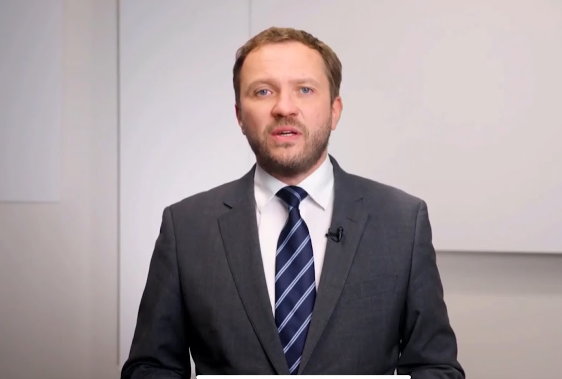
The delegation of Estonia on behalf of the Nordic-Baltic countries (Denmark, Estonia, Finland, Iceland, Latvia, Lithuania, Norway and Sweden) affirmed their support for the Commission of Inquiry and commended its endeavours to compile evidence aimed at ensuring the Russian authorities face consequences for breaching international Human rights law, international humanitarian law, and related international crimes such as war crimes, within the framework of Russia's illicit aggression against Ukraine. Additionally, the coalition of nations vehemently denounced Russia's illegal deportation and coerced relocation of children from Ukraine to Russia – actions that potentially amount to war crimes.
UN Women expressed dee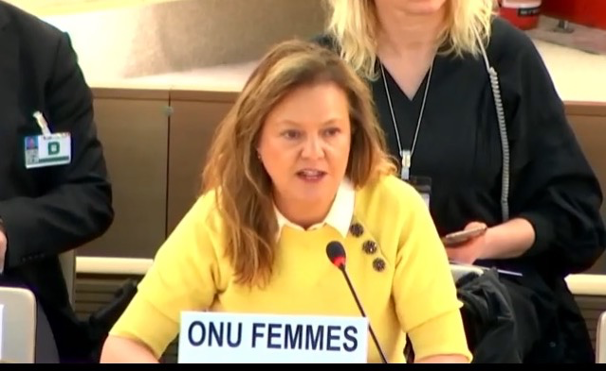 p concern over ongoing reports of rape and sexual violence perpetrated against women and girls by Russian authorities. The Commission's findings vividly depict numerous cases of rape and sexual violence, affecting women and girls aged 15 to 83, constituting acts of war crimes and torture. They expressed unease regarding the heightened vulnerability of women and girls to conflict-related sexual violence (CRSV) amidst the enduring humanitarian crisis and widespread displacement triggered by the invasion. They emphasised that with over 6 million refugees and roughly 3.7 million internally displaced persons (IDPs), the risks of sexual violence and trafficking have surged, particularly among women and children, who form the majority of those forcibly displaced. UN Women condemned these violations and remains committed to supporting the Ukrainian government, women-led organisations, and survivor networks in addressing and mitigating CRSV through the development of survivor-centred, multi-sectoral strategies.
p concern over ongoing reports of rape and sexual violence perpetrated against women and girls by Russian authorities. The Commission's findings vividly depict numerous cases of rape and sexual violence, affecting women and girls aged 15 to 83, constituting acts of war crimes and torture. They expressed unease regarding the heightened vulnerability of women and girls to conflict-related sexual violence (CRSV) amidst the enduring humanitarian crisis and widespread displacement triggered by the invasion. They emphasised that with over 6 million refugees and roughly 3.7 million internally displaced persons (IDPs), the risks of sexual violence and trafficking have surged, particularly among women and children, who form the majority of those forcibly displaced. UN Women condemned these violations and remains committed to supporting the Ukrainian government, women-led organisations, and survivor networks in addressing and mitigating CRSV through the development of survivor-centred, multi-sectoral strategies.
The delegation of the European Union (EU) voiced its apprehension regarding the mounting evidence of breaches of international Human rights law, international humanitarian law, and war crimes. The EU condemned Russia's flagrant disregard for international law. The EU dele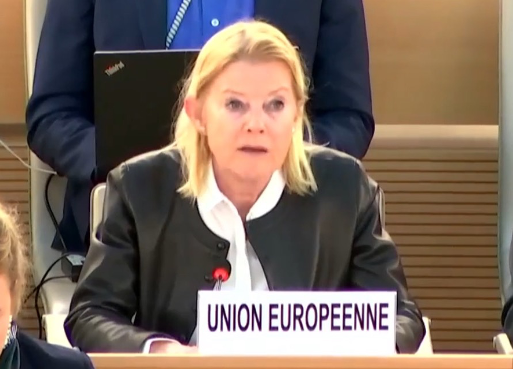 gation affirmed Ukraine's unequivocal right to freedom, independence, and autonomy to choose its own path. The pathway to a comprehensive and lasting peace necessitates the immediate, complete, and unconditional withdrawal of all Russian troops and military equipment from Ukraine, along with respect for Ukraine's sovereignty and territorial integrity. Those accountable for the ongoing and widespread violations of international human rights and humanitarian law must be held fully accountable. Finally, the EU emphasised the critical importance of gathering evidence, and expressed its support for the Commission of Inquiry's efforts. According to the EU, the renewal of the Commission's mandate is a priority.
gation affirmed Ukraine's unequivocal right to freedom, independence, and autonomy to choose its own path. The pathway to a comprehensive and lasting peace necessitates the immediate, complete, and unconditional withdrawal of all Russian troops and military equipment from Ukraine, along with respect for Ukraine's sovereignty and territorial integrity. Those accountable for the ongoing and widespread violations of international human rights and humanitarian law must be held fully accountable. Finally, the EU emphasised the critical importance of gathering evidence, and expressed its support for the Commission of Inquiry's efforts. According to the EU, the renewal of the Commission's mandate is a priority.
The delegation of Italy, aligned itself with the statement of the EU and thanked the commission for providing new evidence of violations of international human rights law, international humanitarian law, and war crimes committed by Russian armed forces. Italy strongly condemned these atrocities and remains resolved in ensuring that those responsible are held accountable in accordance with international law. Italy continues to support investigations led by the Prosecutor of the International Criminal Court, the work of the Commission of Inquiry and other accountability initiatives. Furthermore, 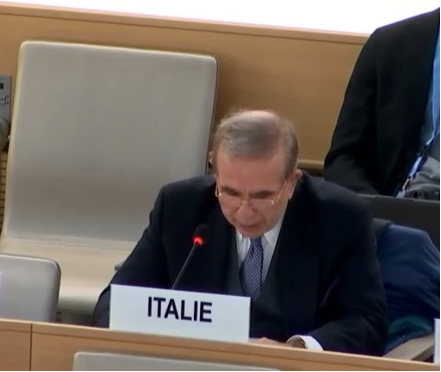 Italy reasserted their unwavering support for Ukraine and stressed the imperative of achieving a fair and lasting peace while upholding Ukraine's sovereignty, independence, and territorial integrity. They called for an immediate ceasefire and the unconditional withdrawal of Russian military forces from the internationally recognized territory of Ukraine.
Italy reasserted their unwavering support for Ukraine and stressed the imperative of achieving a fair and lasting peace while upholding Ukraine's sovereignty, independence, and territorial integrity. They called for an immediate ceasefire and the unconditional withdrawal of Russian military forces from the internationally recognized territory of Ukraine.
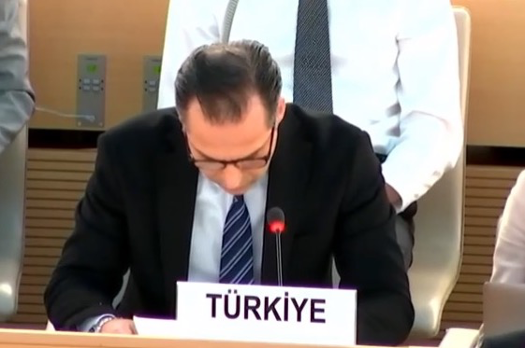 The delegation of Turkey stated that the country does not see the war in Ukraine ending anytime soon as the international community witnesses further atrocities. Considering the escalating toll of the conflict, neither the involved parties nor the broader international community can sustain an enduring state of war. However, Turkey’s stance regarding putting an end to the war has not changed and they stand for a solution through negotiations and diplomacy. Whilst advocating for negotiations does not imply urging Ukraine to abandon its rightful fight, however, the delegation of Turkey noted that, realistically, the present circumstances may not favour an immediate resumption of the mediation process. Nevertheless, the outcome cannot be limited to a choice between a stagnant conflict and an ongoing war and Turkey urged both sides to maintain the possibility of negotiations, as they remain hopeful for an eventual revival of diplomacy between the concerned parties.
The delegation of Turkey stated that the country does not see the war in Ukraine ending anytime soon as the international community witnesses further atrocities. Considering the escalating toll of the conflict, neither the involved parties nor the broader international community can sustain an enduring state of war. However, Turkey’s stance regarding putting an end to the war has not changed and they stand for a solution through negotiations and diplomacy. Whilst advocating for negotiations does not imply urging Ukraine to abandon its rightful fight, however, the delegation of Turkey noted that, realistically, the present circumstances may not favour an immediate resumption of the mediation process. Nevertheless, the outcome cannot be limited to a choice between a stagnant conflict and an ongoing war and Turkey urged both sides to maintain the possibility of negotiations, as they remain hopeful for an eventual revival of diplomacy between the concerned parties.
The dele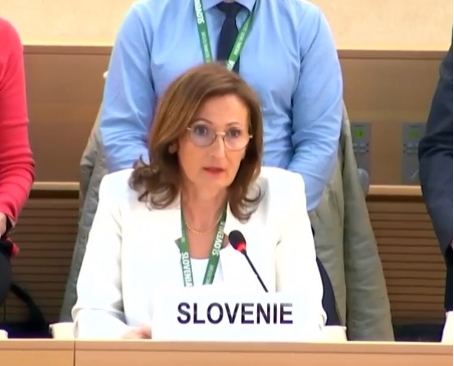 gation of Slovenia stood in alignment with the Commission's apprehensions regarding the documented, severe human rights transgressions, some of which qualify as war crimes amid the invasion of Ukraine. As a party to the International Coalition for the Return of Ukrainian Children, Slovenia condemned the infringements and mistreatment of Ukrainian children's rights, alongside violations of international humanitarian law, encompassing forced displacement and deportation. Slovenia advocates for safeguarding children from any manifestation of violence. Finally, the delegation of Slovernia expressed concern over the unequal burden endured by women amidst the ongoing war, women are subject to sexual and gender-based violence, trafficking, exploitation, torture, and mistreatment. Slovenia continues to advocate for the cessation of hostilities to alleviate the plight of civilians particularly women and children.
gation of Slovenia stood in alignment with the Commission's apprehensions regarding the documented, severe human rights transgressions, some of which qualify as war crimes amid the invasion of Ukraine. As a party to the International Coalition for the Return of Ukrainian Children, Slovenia condemned the infringements and mistreatment of Ukrainian children's rights, alongside violations of international humanitarian law, encompassing forced displacement and deportation. Slovenia advocates for safeguarding children from any manifestation of violence. Finally, the delegation of Slovernia expressed concern over the unequal burden endured by women amidst the ongoing war, women are subject to sexual and gender-based violence, trafficking, exploitation, torture, and mistreatment. Slovenia continues to advocate for the cessation of hostilities to alleviate the plight of civilians particularly women and children.
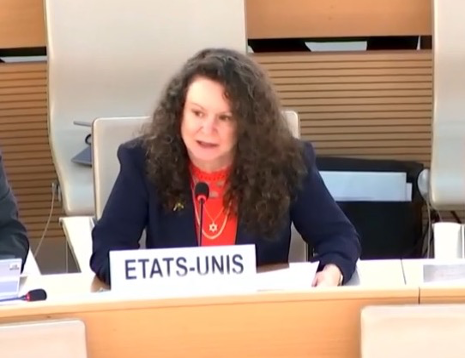
The United States of America delegate noted the urgent need for psychosocial support for Ukrainian victims who have endured atrocities during this on-going war. The delegation stated that the United States will continue to promote accountability for Russia’s actions and recalled sanctions and visa restrictions for individuals connected to the forced transfer and deportation of children. The delegation asked Russia to seize these involuntary transfers of children and other civilians and implore Russia to return them. Finally, the USA asked the Commission for details on how many Ukrainian children have been forcibly transferred and how many civilians were wrongfully detained.
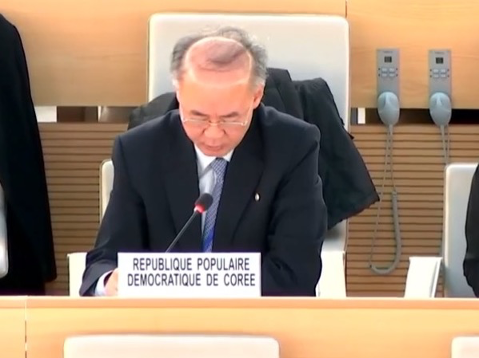 The representative of the Democratic People's Republic of Korea considered that the COI report does not present an objective assessment. The delegation claimed that the report is unbalanced and biassed in relation to the root causes of the Russian-Ukraine crisis, which lies in the hegemonic policies of the United States of America and other Western countries. The Democratic People’s Republic of Korea stated that the causes of the crisis are also linked to NATO's eastward expansion, ignoring Russia's demands for security guarantees. They noted human rights violations committed by Ukraine such as the repression of the Russian language and orthodox churches, the destruction and persecution of political opponents and the activities of those advocating for the restoration of relations with Russia. According to the delegation, the western approach is solely based on political motivation and the attempt to manipulate the Human Rights Council with their own political interests.
The representative of the Democratic People's Republic of Korea considered that the COI report does not present an objective assessment. The delegation claimed that the report is unbalanced and biassed in relation to the root causes of the Russian-Ukraine crisis, which lies in the hegemonic policies of the United States of America and other Western countries. The Democratic People’s Republic of Korea stated that the causes of the crisis are also linked to NATO's eastward expansion, ignoring Russia's demands for security guarantees. They noted human rights violations committed by Ukraine such as the repression of the Russian language and orthodox churches, the destruction and persecution of political opponents and the activities of those advocating for the restoration of relations with Russia. According to the delegation, the western approach is solely based on political motivation and the attempt to manipulate the Human Rights Council with their own political interests.
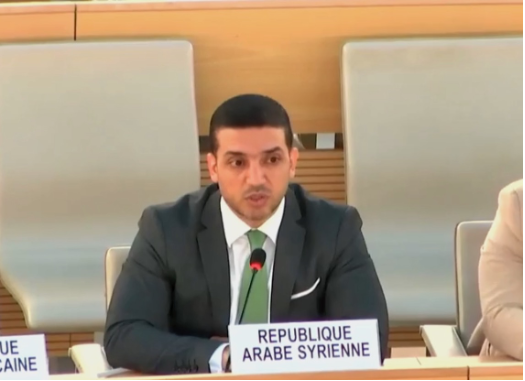 Syria’s delegate stated that the international community is, once again, witnessing a new attempt by western nations to manipulate the Human Rights Council in order to “demonise” and target other countries for their personal political gain. According to the delegate, this effort not only fails to enhance the protection and promotion of human rights, but undermines the Council’s work, exacerbating crises, and further escalating tensions globally. Syria firmly rejected the report as it is biassed and lacks objectivity, merely echoing the Western narrative against the Russian Federation. In their opinion, the report disregards human rights violations committed by Ukrainian authorities, including killings, torture, and discrimination against opponents, particularly those who speak Russian.
Syria’s delegate stated that the international community is, once again, witnessing a new attempt by western nations to manipulate the Human Rights Council in order to “demonise” and target other countries for their personal political gain. According to the delegate, this effort not only fails to enhance the protection and promotion of human rights, but undermines the Council’s work, exacerbating crises, and further escalating tensions globally. Syria firmly rejected the report as it is biassed and lacks objectivity, merely echoing the Western narrative against the Russian Federation. In their opinion, the report disregards human rights violations committed by Ukrainian authorities, including killings, torture, and discrimination against opponents, particularly those who speak Russian.
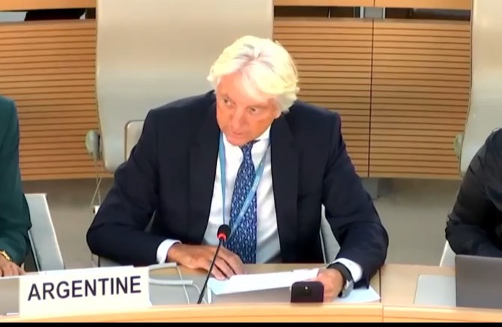 The delegation of Argentina expressed concern over the findings of the report where the Commission found further evidence that in the context of its invasion of Ukraine, Russian authorities have committed a wide range of violations of international human rights law and international humanitarian law, as well as war crimes. The evidence gathered has reinforced the Commission's previous findings that the Russian authorities used torture in a widespread and systematic manner. Argentina urged Russia to immediately provide information on the number of children that have been deported to Russia and their whereabouts; and to promptly initiate their return in accordance with their international obligations. The delegation reiterated to the Russian Federation to immediately cease the use of force, and strongly condemn the invasion of Ukraine, while reaffirming their strong commitment to its sovereignty, political independence, unity and territorial integrity.
The delegation of Argentina expressed concern over the findings of the report where the Commission found further evidence that in the context of its invasion of Ukraine, Russian authorities have committed a wide range of violations of international human rights law and international humanitarian law, as well as war crimes. The evidence gathered has reinforced the Commission's previous findings that the Russian authorities used torture in a widespread and systematic manner. Argentina urged Russia to immediately provide information on the number of children that have been deported to Russia and their whereabouts; and to promptly initiate their return in accordance with their international obligations. The delegation reiterated to the Russian Federation to immediately cease the use of force, and strongly condemn the invasion of Ukraine, while reaffirming their strong commitment to its sovereignty, political independence, unity and territorial integrity.
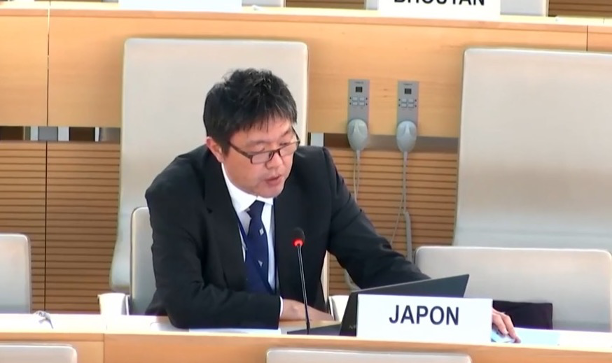 The delegation of Japan vehemently denounced the actions of Russian forces which have resulted in numerous civilian casualties in Ukraine. Indiscriminate attacks targeting innocent civilians constitute a serious violation of international humanitarian law and are unacceptable. Japan acknowledges and supports the investigation being carried out by the Independent International Commission of Inquiry on Ukraine, recognizing its significance in identifying and holding accountable those responsible for human rights violations or abuses. As Japan continues to stand with Ukraine, their role in returning peace to the region was demonstrated during the Japan-Ukraine Conference for Promotion of Economic Growth and Reconstruction in February 2024, where, with the participation of public and private sectors from both countries, a total of 56 cooperation documents were unveiled.
The delegation of Japan vehemently denounced the actions of Russian forces which have resulted in numerous civilian casualties in Ukraine. Indiscriminate attacks targeting innocent civilians constitute a serious violation of international humanitarian law and are unacceptable. Japan acknowledges and supports the investigation being carried out by the Independent International Commission of Inquiry on Ukraine, recognizing its significance in identifying and holding accountable those responsible for human rights violations or abuses. As Japan continues to stand with Ukraine, their role in returning peace to the region was demonstrated during the Japan-Ukraine Conference for Promotion of Economic Growth and Reconstruction in February 2024, where, with the participation of public and private sectors from both countries, a total of 56 cooperation documents were unveiled.
Non-Governmental Organisations (NGOs)
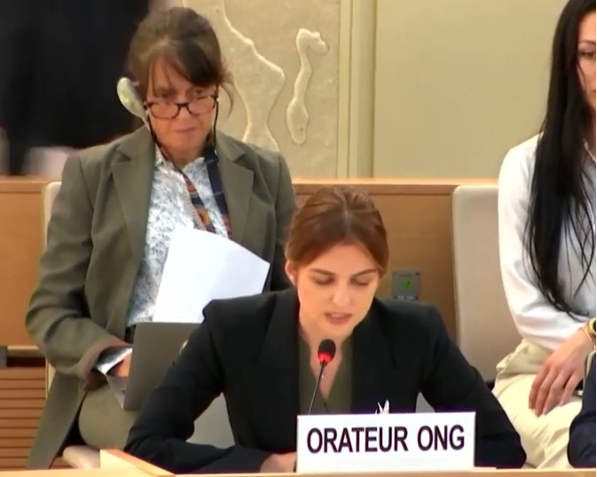 Non-governmental organisations (NGOs) supported the report of the International Commission of Inquiry regarding the conflict in Ukraine engaged by Russia. Since the full-scale invasion, a large number of NGOs have persistently underscored the atrocities unfolding in the conflict-stricken regions, such as forced displacement, abductions, torture, bombing, etc.
Non-governmental organisations (NGOs) supported the report of the International Commission of Inquiry regarding the conflict in Ukraine engaged by Russia. Since the full-scale invasion, a large number of NGOs have persistently underscored the atrocities unfolding in the conflict-stricken regions, such as forced displacement, abductions, torture, bombing, etc.
They have brought to light the disproportionate assaults inflicted upon the civilian population and civilian infrastructure including schools, hospitals and culturally significant sites. From the abduction of children to the imposition of Russian citizenships, NGOs have emphasised the suffering endured by innocent individuals. The present NGOs recalled that throughout the extensive military intervention, Russian forces have perpetrated war crimes and other humanitarian violations.
Many NGOs’ statements recalled that the Russian military is employing torture against civilians to coerce information, instill fear and suppress resistance, especially in regions under Russian occupation, potentially constituting crimes against humanity. NGOs condemned attacks on civilians, the systematic use of torture, illegal detentions and enforced disappearances. Numerous NGOs called on the Commission to continue its investigation on the war in order to ensure accountability for the perpetrators and ensure justice for the victims.
Concluding remarks
Mr. Eric Møse and other members of the Commission reiterated the urgent need for accountability. In order to do so, Mr. Møse stressed the need to gather evidence and practice bilateral and multilateral cooperation.
Ms. Grover highlighted that when it comes to transferring children and ensuring their return, it primarily happens through either families taking individual action or through diplomatic efforts between nations. She also noted the need for a reliable and comprehensive database combined with a DNA database, in order to ensure long term returns and reunifications. The members of the Commission noted their concern regarding difficulties in accessing Ukraine, especially in territories presently occupied by the Russian Federation.
Finally, Mr. P. DE Grieff emphasised the importance of the role the international community holds in respect to large reparation programs, as well as the part they play in attempting to implement immediate mental health support.
Geneva International Centre for Justice (GICJ) Position
Geneva International Center for Justice (GICJ) applauds the work of the Commission to gather evidence of the worsening human rights conditions in Ukraine and the continuous violations of international law and international humanitarian law by parties to the conflict. GICJ advocates for a peaceful resolution to the Russo-Ukrainian conflict, emphasising the importance of upholding international law, human rights, and justice. We call for cooperation among concerned parties to ensure the protection of civilians and Ukrainian civilians’ infrastructure in respect of the Geneva Conventions. Moreover, a unified reaction to the atrocities unfolding in Ukraine, including torture, the forcible relocation of children, and arbitrary detention, must remain steadfast to ensure accountability and justice. GICJ supports the efforts of the Commission in gathering proof with the goals of ensuring that all perpetrators of war crimes and human rights’ violations are held accountable.
#HRC55 #Geneva #HumanRights #Geneva International Center for Justice #Geneve4Justice #Ukraine #Russia #InteractiveDialogue #CommissionofInquiry #COI_Ukraine







